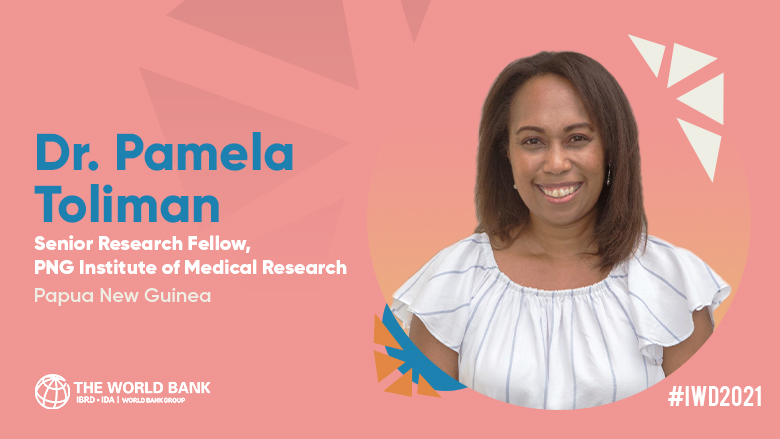How did you end up working in medical research?
I'm from Rabaul in East New Britain Province, but I spent a lot of time in Australia for my education. I went to high school at St Peters Lutheran College in Brisbane, which has a long history of connection to PNG. Then I attended The University of Queensland, where I did a Bachelor of Science, majoring in molecular genetics and microbiology, and a Bachelor of Arts, with a double major in sociology and gender studies.
At the end of my studies, I had a really strong conviction to move back to PNG. I had a strong sense of wanting to contribute to development in my country. I hadn't worked out how exactly, but I spoke with a few scientists at the PNG Institute of Medical Research and they shared the sort of work they were doing, and it just spoke to me. I got a job there and I've been working at the Institute in Goroka for close to 20 years.
What inspires you about medical research work?
The Institute is small, but we do real evidence-based research, and in a country like PNG, with such a small health budget, you need to be able to use the money that you have well. I earnestly believe in the mission and mandate of this place. I've been able to be involved in research that has a direct and tangible impact on the lives of the people in this country, particularly women and girls.
I specialize in the space of sexually-transmitted infections and reproductive health, and seven years ago I began working in the cervical cancer screening space and decided to base my PhD on it. I have always had a burden on my heart to do more for women and girls in PNG, and cervical cancer exemplifies how women are often forgotten in society.
Why is researching cervical cancer screening in PNG so important?
Cervical cancer is a preventable cancer and the fact that women and young girls are being affected by this disease is just inexcusable. That's the case throughout the world, but anecdotal evidence suggests that between 1500 and 2000 women die every year in PNG from cervical cancer. That is just what we can count; there are many, many cases in rural PNG that are not counted. Half of our population is [at risk of being] affected by this disease, but we have yet to establish a prevention program, a screening program or a treatment program for cervical cancer in PNG.
You need to be outraged. You absolutely need to be outraged by what you see and be moved to do something about it. We need to have a mechanism for screening women and detecting cervical changes early and have ways of treating women before it advances to cancer. I'm so blessed to be part of a team that believes in the goal, which is to establish a national screening program for this country.
What advice would you give Pacific women in 2021?
My biggest lesson coming out of 2020 is balancing self-care with being a mother and work. It’s something that I really struggle with. Just making sure that you're okay – physically, mentally, emotionally is really, really important.
As women in the Pacific, we're just natural givers to our family, to our communities and sometimes that happens at the expense of our own health and well-being. If you were to fall over; imagine what would happen to your family.
The great thing about the test we have been researching and trialing is that women can come to the health center and take a self-collected swab, and then have a result within an hour. We've basically tried to create a test that doesn't cost women time because time is money. For PNG women it's time away from family and time that they could be at the market selling produce, for example.
I think that would be my message to myself, as well to my sisters, to my mothers, to my daughters: just for a moment, go take care of yourself.
Finally, what do you miss most about PNG when you are away from home?
When I was in Australia, I always missed PNG food. I actually have a little food blog called For the Love of Loaves, where I share recipes of how to make things from what you can grow and source in the highlands of PNG, because most of the time you can't get all the ingredients. I revamp recipes that you can do without needing all the ingredients like making ricotta from scratch or making your own buttermilk. I actually started making jam, bringing it into work and selling it, and it just ended up being this whole thing.
Follow World Bank Pacific on Facebook to make sure you don’t miss any of our Pacific Women in Leadership series.
**The views expressed in this interview do not necessarily represent the views of the World Bank Group and its employees.

